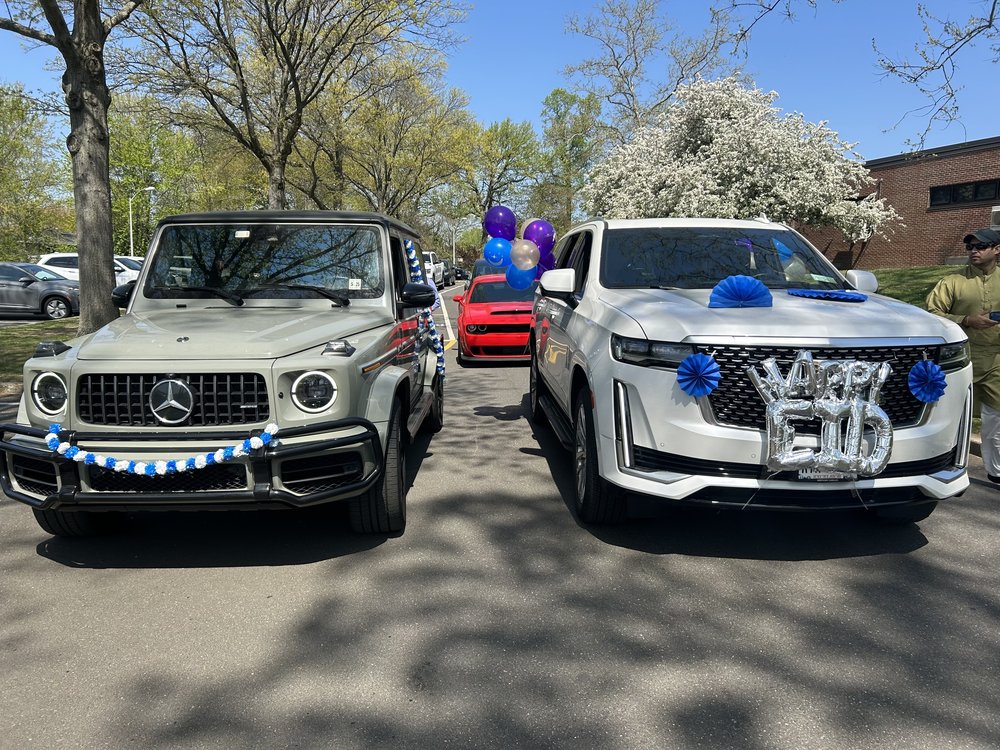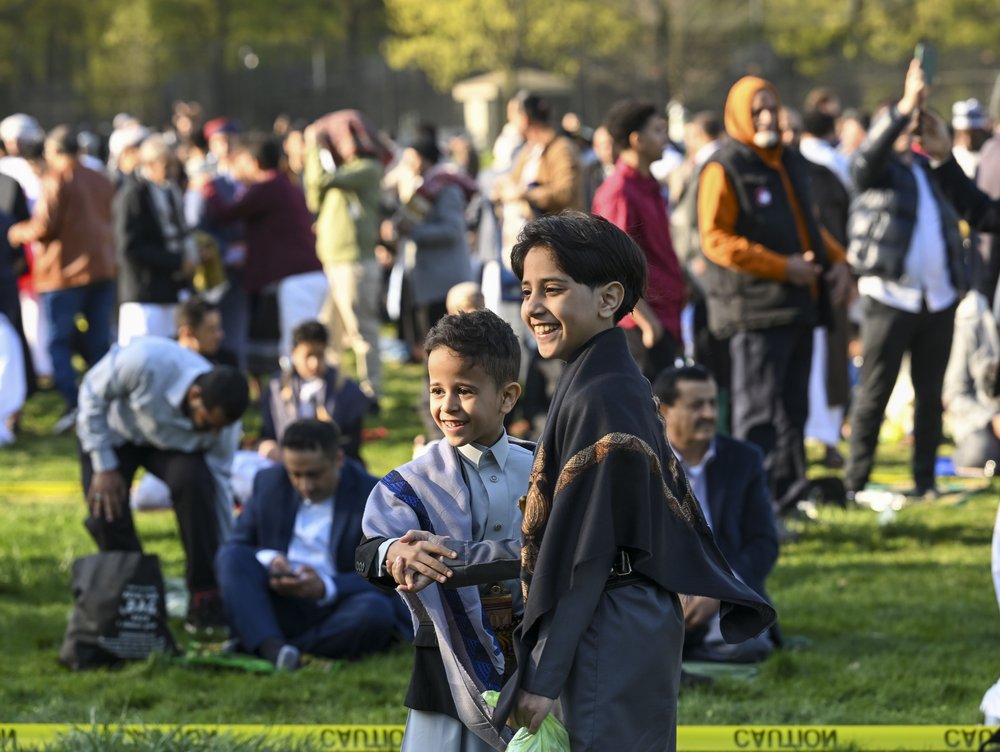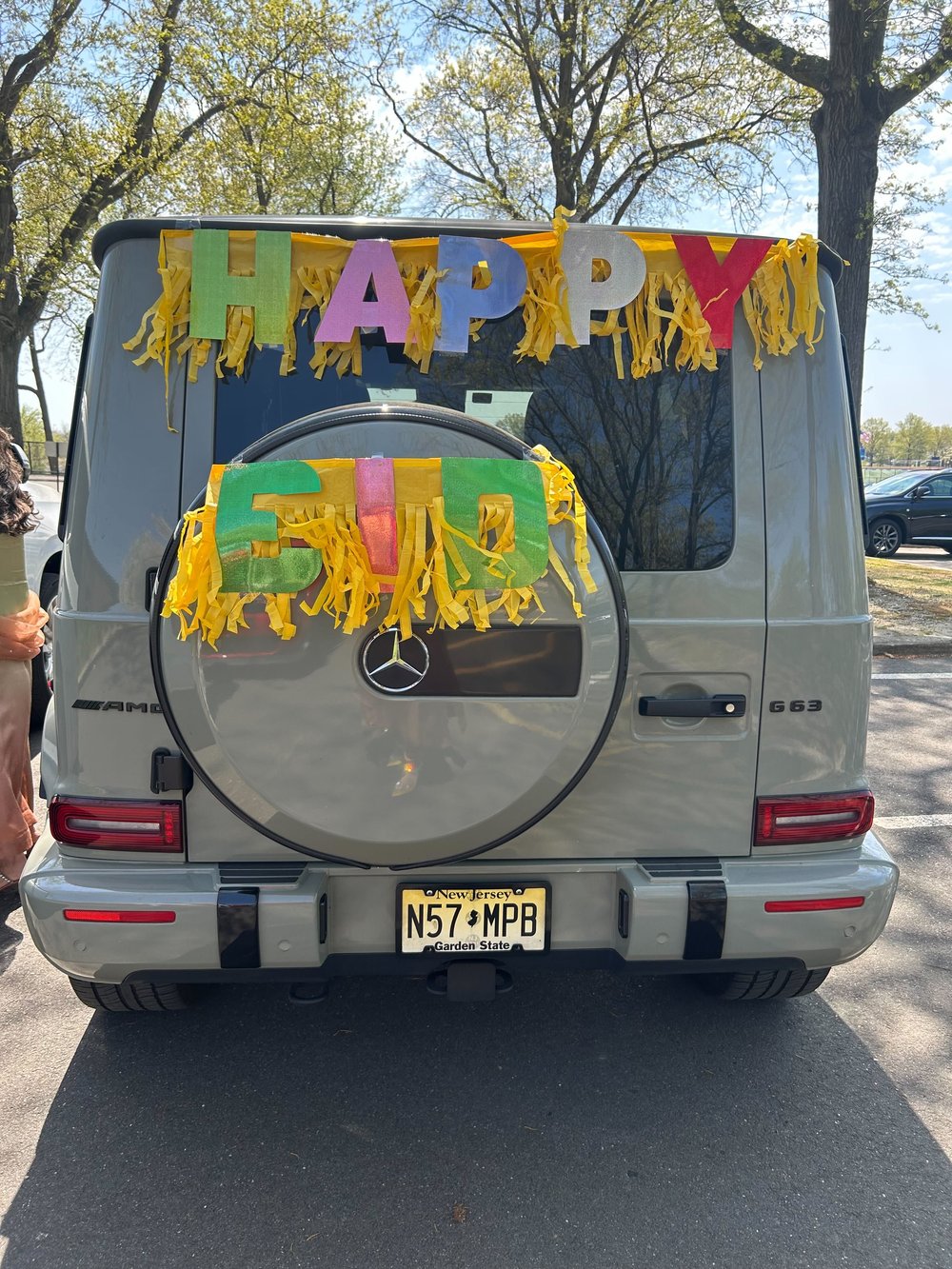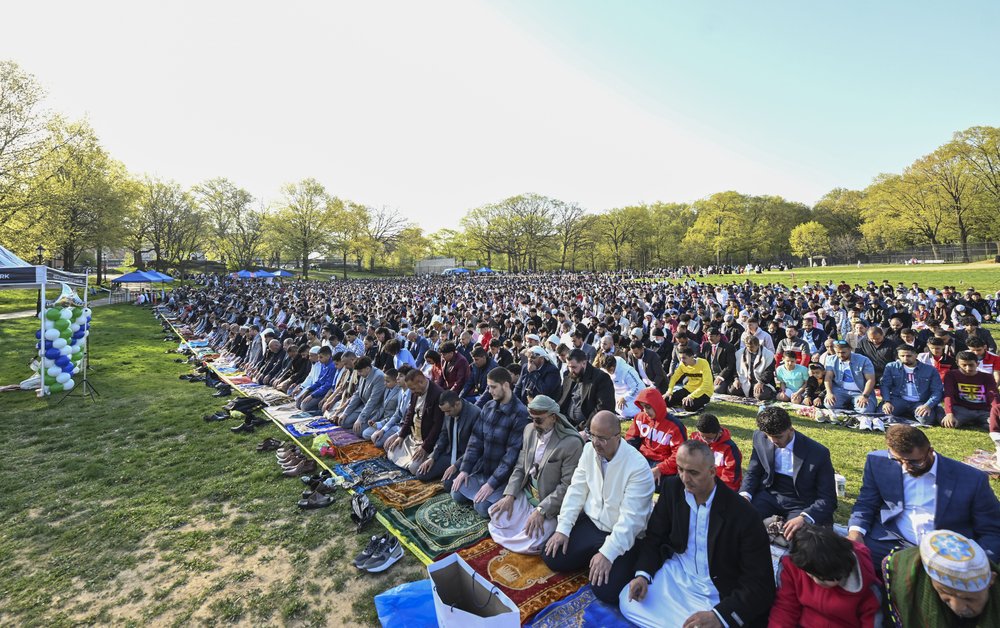Eid, Ramadan's end, celebrated with flair by some NY Muslims
April 21, 2023, 5:53 p.m.
Some celebrations marking the end of Ramadan are splashy affairs in communities throughout the city, while tradition governs in many others.

A parade of cars in the suburbs. $4,500 gowns. A club night in Bushwick, without alcohol. Another, in Midtown, with a lot of it.
For many Muslim New Yorkers, Eid al-Fitr, the day that marks the end of Ramadan, has transformed from a relatively modest, community-centered occasion into something else altogether: a splashy and often spectacular affair that is increasingly acknowledged by mainstream America as well as popular culture.
“I think there has always been this perception of Muslims that we take ourselves too seriously or that we don't know how to have fun and one of the things that have really changed is how much young people truly celebrate Eid,” said Kashif Shaikh, the president of the Pillars Fund, a nonprofit that amplifies Muslim storytellers in New York and other cities. “Go check out Instagram on Eid: you will see people showing off their clothes, their Eid prayer locations, their family pictures. It really is quite incredible compared to when I was a kid.”
I think Eid finally feels like an authentic American holiday and not just something a handful of Muslims in America are celebrating at their mosque.
Kashif Shaikh, the president of the Pillars Fund
Eid falls on Friday, April 21, and marks the end of Ramadan, a month of prayer and daily fasting observed by the estimated 450,000 Muslims in New York City. In the decades since the Sept. 11 attacks, the community has at times experienced bigotry, vilification and police surveillance. But it has also seen a rise in its influence, with growing Muslim political representation in the City Council and Legislature and the call to prayer broadcast for the first time in Queens this year.
For Shaikh, a critical threshold of acceptance has been reached.
“I think Eid finally feels like an authentic American holiday and not just something a handful of Muslims in America are celebrating at their mosque,” he said.
Corporate America has certainly embraced the holiday. You can purchase an Eid greeting card from Hallmark or Eid balloons from Party City, or take Ramadan decor tips from Crate and Barrel.

“Set up a countdown calendar or chalkboard to Eid al-Fitr,” the company suggests. “Surprise your children with a small treat every night as you mark that Eid is one day closer.”
This year, Shaikh said he, his sister and her two small children started the holy month with a trip to Target, where they picked up some Ramadan-themed decorations.
“That felt like a massive cultural shift,” he said.
Days later, he was astounded to see Ramadan referenced in a recent "Saturday Night Live skit" by none other than Donald Trump, as performed by SNL cast member James Austin Johnson.
“We love to say Ramadan,” says the fictional Trump. “That’s fun!”

The changes have come with increased government recognition. The New York City public school system, for instance, made Eid an official holiday in 2016. While the actual Trump broke a 20-year tradition of hosting a White House dinner to mark Eid, President Joe Biden and First Lady Jill Biden restored the practice.
An Eid celebration born of necessity
Shaheda Quraishi is a physician who lives in Herricks in Nassau County, Long Island, where she and her husband raise their three children, ages 5, 12 and 13.
During the pandemic, she said, members of the Muslim community sought a way to safely celebrate Eid. The children especially “felt disjointed from their peers, so we wanted a way to spread our holiday cheer to our friends and neighbors in the community,” she said.
The result was an Eid car parade, which included over 100 cars last year and slated to take place again this year on Friday. Quraishi said the cars are decorated with balloons, streamers, banners and even floral arrangements. Some have messages scrawled on the windows with chalk, and the children wave pom-poms from the cars, or blare songs, like the Arabic hit "Eidun Saeed" by Mesut Kurtis and Maher Zain.

“And we beep, honk, and shout while we drive through our neighborhood,” she said.
The local Muslim community is diverse, comprising Bangladeshi, Indian, Pakistani, Egyptian, Guyanese and Moroccan families, Quraishi said. But they publicize the parade route to the entire community and Quraishi said many non-Muslim neighbors “come out of their houses to wave and join the fun.”
This is deeply moving to Quraishi, who is the daughter of Bangladeshi immigrants and moved to the area when she was 9.
“It really is such a proud moment for me to be able to literally ‘shout it out’ on the streets where I grew up myself,” she said.
Club nights and Eid galas
Some Eid celebrations veer quite far from the traditional.
Amit Anand, who spins as DJ Dynamite, is throwing a queer Eid party Saturday night at Thirst in Midtown, complete with drag queens. And alcohol.
“So it is, uh, as haram as haram could get,” he said, using the Arabic word for “forbidden.”
Anand, a Hindu, grew up outside of New Delhi, where he fondly recalls celebrating Ramadan with Muslim friends, who in turn celebrated Hindu festivals.
“We sort of want to recreate that more than anything else,” he said, adding that he’ll be joined by a Middle Eastern collaborator, DJ Fursa.
Meanwhile, on Sunday over at the rooftop of Bushwick's Sultan Room, DJ Myyuh, an Egyptian American, will be trading sets with another DJ, Carmen Sandiego. Their Eid event, which features only feature nonalcoholic options like chai, will also include a henna artist.
“These choices felt like a more suitable fit for the theme of this event, since Eid is not something I would celebrate in a nightclub necessarily.”
The event, said Myyuh, starts relatively early, at 5 p.m., in order to draw people who wouldn’t necessarily stay out late, and is the first she’s done for Eid.
“I feel connected with other Muslims in a beautiful way that I never experienced as a child,” she said. “A lot of it has to do with me being curious about how to deepen my own connection with Islam and community, asking myself how I would like that relationship and identity to evolve as I grow older.”
Other Eid events are geared toward more conservative adherents. In the Bronx, the Sisters Eid Gala on Saturday is a women’s only affair.
“Sisters wear your best gowns and dress to impress,” reads the online flier. The theme colors are black, white and gold.
Attendees will compete in Quran recitation, Islamic trivia and other games.
“On this special night, we will be celebrating our religious values and beliefs that we've worked hard on all Ramadan In Sha Allah,” the event page reads.
For some adherents, only couture will do
One of the biggest changes in how Eid is celebrated is the sheer opulence of the occasion.
Engie Hassan, a fashion stylist who runs Engie Style and reaches hundreds of thousands of followers on Instagram, said it’s not unusual for women to spend hundreds of dollars on an Eid outfit they purchase at Macy’s or Nordstrom, as well as hundreds more for the right pair of shoes, purse and other accessories.
But that’s just for starters.
As a personal shopper whose clients include wealthy New Yorkers as well as flesh and blood royals in Saudi Arabia, the United Arab Emirates and Qatar, Hassan said an Eid gift for a loved one or for oneself, can mean a handbag from Chanel, Dior or Hermes, running anywhere from $2,000 to $9,000. An Eid gown from Dody’s Dresses can cost $4,500. But “middle-class families” are just as likely to splurge for the occasion.
“It’s like the Met Gala for Muslims,” she said.
Then there’s couture.
“This year a couple clients asked for a couture spring collection of Elie Saab that was inspired by India,” said Hassan. “Those start at $20,000.”
For many, Eid remains rooted in faith.
Imam Al-Hajj Talib 'Abdur-Rashid, the senior imam at the Mosque of Islamic Brotherhood in Harlem, said he’d be speaking to worshipers at Eid prayer services. His sermon, he said, would be about “guarding our souls as much as possible against committing transgressions of the limbs and senses.”
Still, he said in an email, “fun and festivities are always part of the day's celebration in the African American Muslim community.”
Talib, now in his 70s, said the joy of Eid comes from celebrating with adults he knew as kids, and who now have their own children “running about” and playing games.
“For elders (like me) the fun is in fellowship and good food,” he said.
And good drink.
“At the MIB we have a traditional recipe for a hibiscus ginger punch that I really like,” he said. “It's only made two or three times a year.”
The headline on this article was updated.
Muslims in New York, joined by allies, observe the holy month of Ramadan As Ramadan draws to an end, area Muslims look to aid those who are food insecure NYC is more ethnically diverse, less racially segregated, report finds